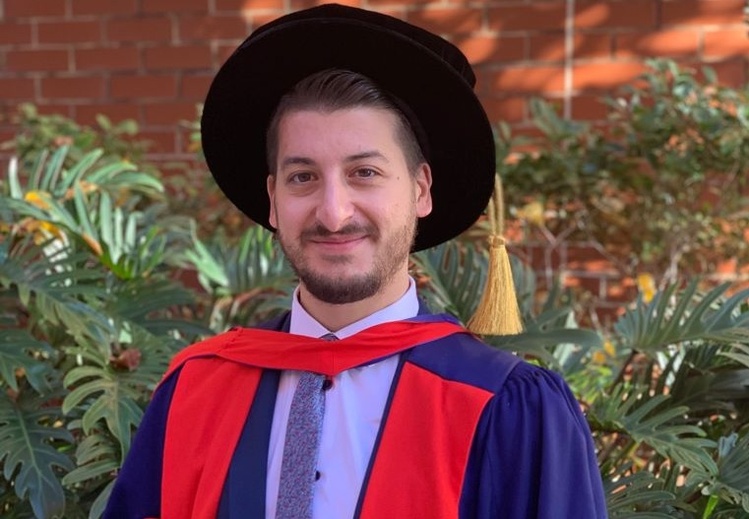In 2020, Fulvi was awarded the Dean’s Thesis Prize for the Best PhD at the School of Humanities and Communication Arts.
Fulvi’s interest in philosophy, triggered by an inspiring teacher at his high school in Italy, has proved to be greater than a passion, leading to numerous degrees, a career in academia and an award-winning dissertation.
Despite being born and raised in the tiny mountainous Abruzzese town of Capitignano, Fulvi was not starved of opportunity, attending the prestigious University of L’Aquila to complete his undergraduate degree in philosophy and then the University of Florence for his masters, also in philosophy.
Due to a lack of funding for PhDs and post-doctoral research, Fulvi’s applications to complete his PhD in Italy were unsuccessful.
Fascinated by Australia and its Indigenous culture from a young age, Fulvi quickly embraced the chance to apply for a PhD scholarship at Western Sydney University when it arose.
“It was kind of a dream come true receiving this scholarship,” Fulvi nostalgically recalled.
“I could move to the land that I had always dreamed of.
“Since day one I have always liked the ‘relaxed’ lifestyle that I see in Australia.
“Even though Sydney is a very big city, if I compare it with cities such as Rome, it seems to me that it is not as hectic and busy.”
Fulvi recalls that everyone in Sydney was so friendly and welcoming to him.
Upon his arrival, he consciously interacted with locals and fully immersed himself in the Australian culture.
In his dissertation, Fulvi analysed the work of two specific philosophers, Schelling and Pareyson, to investigate the question of evil in relation to freedom.
“The goal of my thesis was to demonstrate that freedom is fundamentally a matter of resistance because you have to resist the occurrence of evil in order to act well and be free,” Fulvi explained.
On his three-and-a-half-year writing journey, Fulvi spent time in Germany and Italy to complete fieldwork.
He emphasised the fulfillment he felt not only writing, but also reading and researching, mentioning that he loved every single moment of his PhD.
Fulvi’s immense passion for philosophy and education shines through in his character.
When asked if he had faced any adversity as an international student, Fulvi mentioned his disappointment in the lack of travel concessions available for international students in New South Wales.
Notably, in 2017, Fulvi coordinated a campaign asking the NSW government to entitle international students to such concessions, which gained more than 8000 signatures and was delivered to parliament with the support of local MPs and university councils.
Fulvi “couldn’t be more thankful” for the support he received from his supervisors, Associate Professor Paolo Diego Bubbio and Professor Dennis Schmidt, who kept him motivated whilst he wrote his PhD.
“Even when I was feeling down or insecure about my work, they always knew what to say to cheer me up and they encouraged me to go to Italy and Germany when I didn’t want to in the first place,” he said.
These very professors nominated Fulvi for the honourable award.
“I was really surprised when I found out about the award, like I couldn’t believe it,” Fulvi said.
“What an important acknowledgement of the hard work I’ve done in the last few years!”
Although it is hard being away from his family who are in Italy, Fulvi knows that they understand he is staying in Australia to achieve his personal and professional aspirations.
“My plan and hope for the future is to keep working in academia as a lecturer or research fellow and I am really happy with that,” he said.
Fulvi is currently working at Western Sydney University, teaching classes and conducting small research activities, and also teaches Italian at a number of schools across Sydney.
He maintains a close relationship with the Italian community, particularly with the Federation of Italian Migrant Workers and Families (FILEF).
Fulvi dedicates this award to his professors, his partner Mietta and his family back home in Italy.
He is a living example of a modern Italian migrant success story, and his experience suggests that Australia is still the same lucky country it was for so many Italian migrants over 50 years ago.












